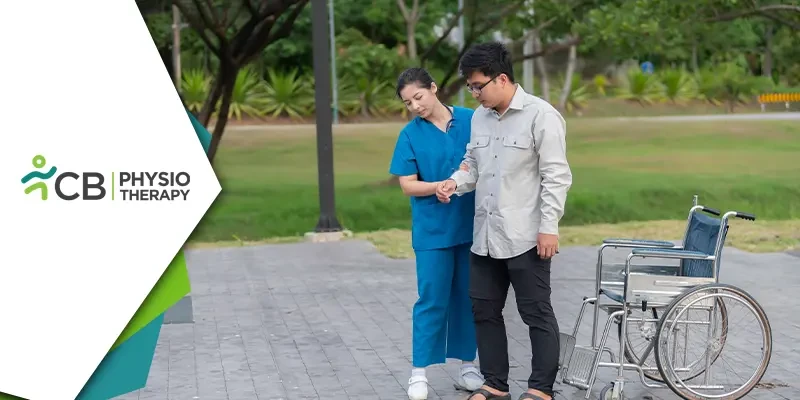For many of us, the ability to see the world around us is something we often take for granted. We rely on our vision to navigate the physical world, interact with others, and perform various tasks seamlessly. However, for those who are visually impaired, the absence or impairment of sight can significantly impact their quality of life and ability to engage in daily activities. In such cases, physiotherapy emerges as a vital ally, offering a transformative role in the lives of the blind. In this blog, we will explore the profound impact that physiotherapy can have on individuals who are blind or visually impaired, helping them enhance their mobility, independence, and overall well-being.
Understanding Visual Impairment
Visual impairment encompasses a wide range of conditions that affect a person's ability to see, from partial loss of vision to complete blindness. These conditions can be congenital or acquired and may result from various factors, including genetics, injuries, or medical conditions. Regardless of the cause, the consequences of visual impairment can be significant, often leading to challenges in mobility, independence, and overall quality of life.Role of Physiotherapy
Physiotherapy, also known as physical therapy, is a healthcare profession that focuses on helping individuals improve their physical function and mobility. While physiotherapy is often associated with treating musculoskeletal conditions and injuries, its role extends far beyond that. In the case of individuals who are blind or visually impaired, physiotherapy can be a powerful tool to address a range of physical and functional challenges.Mobility and Orientation
One of the primary challenges for people with visual impairment is mobility and orientation. Physiotherapists work with these individuals to develop and enhance their mobility skills, helping them navigate their environment confidently. This includes teaching techniques such as proper cane use, balance exercises, and gait training. Physiotherapy helps individuals develop a keen sense of spatial awareness and proprioception, enabling them to move safely and independently.Falls Prevention
For individuals with visual impairment, the risk of falls is significantly higher. Physiotherapists can design personalized exercise programs to improve strength, balance, and coordination, reducing the risk of falls and related injuries. Falls prevention is crucial in maintaining the safety and well-being of blind individuals, allowing them to move more freely without fear.Pain Management
Visual impairment can lead to secondary musculoskeletal issues due to altered posture, gait, or compensatory movements. Physiotherapists can address these issues by providing thermotherapy, TENS, ultrasound therapy, Laser therapy, manual therapy, stretches, and exercises to alleviate pain and improve overall comfort. By addressing these concerns, physiotherapy helps individuals focus on their daily activities without the distraction of chronic pain.Enhancing Independence
Independence is a key aspect of maintaining a high quality of life for individuals who are blind. Physiotherapists work with their patients to maximize independence in daily activities. This may involve teaching strategies for activities of daily living, such as dressing, cooking, and cleaning. By providing adaptive techniques and tools, physiotherapy empowers blind individuals to carry out these tasks independently.Mental and Emotional Well-being
The mental and emotional well-being of individuals who are visually impaired is often overlooked but is of paramount importance. Physiotherapy can include exercises that promote relaxation, reduce stress, and improve mood. Furthermore, the sense of accomplishment that comes from mastering new physical skills can boost self-esteem and confidence, contributing to a positive mindset.Rehabilitation and Post-Surgery Care
In cases where visual impairment is the result of surgery or injury, physiotherapy plays a crucial role in the rehabilitation process. Physiotherapists work closely with individuals to regain lost physical function, ensuring a smoother transition back to their daily lives. They use a combination of exercises, modalities, and hands-on techniques to facilitate recovery.Case Studies: Real-Life Transformations
Let's take a closer look at two hypothetical case studies to understand the transformative power of physiotherapy in the lives of individuals who are blind:Case Study 1: Sarah, a 32-year-old woman, was born blind. Despite being highly intelligent and motivated, she faced challenges in mobility and independence. With the help of a physiotherapist, Sarah learned orientation and mobility techniques that enabled her to navigate her college campus and later her workplace confidently. She also received training in using adaptive tools for cooking and managing her daily chores. Today, Sarah is a successful professional who lives independently and travels with ease.
Case Study 2: Raghav, a 45-year-old man, lost his sight due to a medical condition. This sudden change drastically affected his life. He felt frustrated, isolated, and was in constant pain due to his altered posture. Through physiotherapy, Raghav received pain relief and was taught fall-prevention strategies. He also underwent psychological support to manage his emotional challenges. With time, Raghav regained his physical comfort and mental well-being, allowing him to rebuild his life with a newfound sense of purpose.
The role of physiotherapy in the lives of individuals who are blind or visually impaired cannot be overstated. It serves as a lifeline, enabling them to break down physical barriers, enhance mobility, and regain independence. Through a combination of personalized exercises, training, and support, physiotherapy empowers blind individuals to lead fulfilling lives, pursue their goals, and participate fully in society.
As we continue to recognize the value of inclusivity and accessibility in our society, it is crucial to acknowledge and support the critical role that physiotherapists play in improving the lives of those with visual impairments. By providing the necessary tools and guidance, physiotherapy not only transforms the physical abilities of individuals but also empowers them to embrace their blindness as a part of their identity and live life to the fullest.

